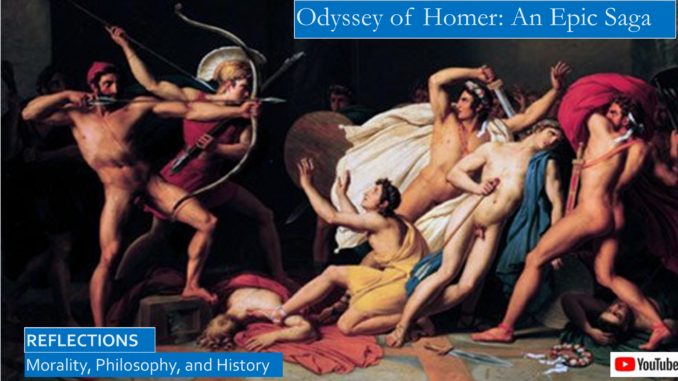
The nymph Calypso does give Odysseus provisions as he builds a sturdy raft which he launches for home, but the god of the sea, Poseidon, angry at Odysseus for reasons we will soon learn, raises storms that wreck the raft of Odysseus, and he is adrift at sea for days, and he finds a cove in a river on an island where he falls asleep exhausted in a bed of leaves, totally naked.
The next morning Odysseus is awaked by the chatter of maidens. He wonders, How can I appeal to these maidens for some food and hospitality without scaring them off? Professor Vandiver has a wonderful description of how he solves this dilemma. Holding a branch of leaves in front of his lower portions, he begins a shrewd speech, “I am your suppliant, princess. Are you some god or mortal? If you are one of the gods who hold the open sky, to Artemis, daughter of might Zeus, in beauty, height, and bearing I find you most resemble. But if you are a mortal, most happy are your father and your honored mother, most happy your brothers also. Surely their hearts ever grow warm with pleasure over you, when watching such a blossom moving in the dance.” And he goes on with careful flattery, winning her over, for she is a princess, she gives him food and a tunic, and she tells him how to present himself to the king and queen.
Odyssey Blog 1 http://www.seekingvirtueandwisdom.com/odyssey-blog-1-waiting-those-very-long-years-for-odysseus/
The YouTube video for the Odyssey is: https://youtu.be/bUW4ZT9zpt8
The YouTube script includes more book links: https://www.slideshare.net/BruceStrom1/odyssey-by-homer-adventures-of-odysseus
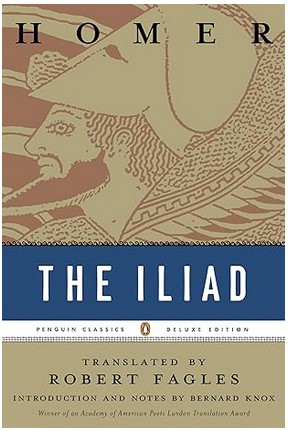

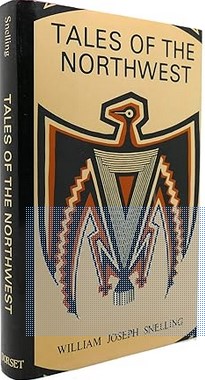
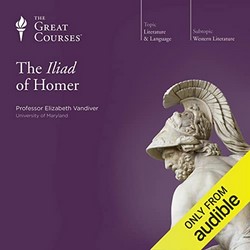
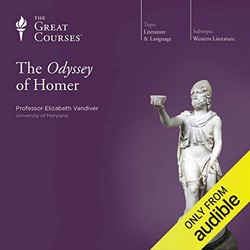
Later that day when he presents himself at the palace, the queen notices the stranger is wearing a tunic belonging to her daughter. King Alcinous shows great hospitality and xenia, inviting the stranger to a banquet where a blind bard sings of the mighty deeds of Odysseus and his Trojan horse that won the war, bringing the stranger to tears, arousing the curiosity of the king. The next day, after a night of much needed rest, Odysseus tells the king the tales of his travels after the fall of Troy.
The first adventure was when their ship landed at Ismarus. Odysseus remembers, “there I destroyed the town and slew its men; but from the town we took the women and great stores of treasure, and parted all,” so everyone had their proper share. There is no fault is found for the Achaeans playing the part of Viking raiders or pirates, especially since the booty was evenly shared, but the men are blamed for foolishness by lingering to celebrate rather than quickly sailing away as Odysseus advises, for they are attacked and suffer heavy loses before they set sail.
After that they sail to the land of the Cyclops. Odysseus and a dozen men climb up to the cave of one of the giant cyclops. After the giant rolls a huge stone over the opening of the cave, and tends to his flock of sheep, he asks the strangers who they are. Odysseus asks for hospitality. The giant responded by “seizing two of the men and dashed them to the ground like dogs. Their brains spattered on the floor. Tearing them limb from limb, he made his supper, and ate like a mountain lion, leaving nothing, entrails, or flesh, or marrow bones.”
Odysseus plotted. The next, after the Cyclops ate another two Odysseus’ men for dinner, Odysseus asked him if he would like some wine from their ship. After drinking the wine, the giant asks Odysseus his name, and he said it was NoMan.
While the Cyclops was fast asleep from the wine, Odysseus and his men drove a large wooden stake into his one eye, blinding him. The Cyclops jumped up and tried feeling about for the men in vain. The next morning, they each escaped by hanging onto the bottom of the large sheep and rams as Cyclops let them out to pasture. After escaping the men loaded the sheep onto their ships, and Cyclops roared at them and threw boulders into the sea near their ships.
When the other Cyclops yelled at him asking who did this to him, he yelled back, “Noman blinded me.” Odysseus should have just quietly escaped, and his men tried to dissuade him, but Odysseus just had to yell back, “Cyclops, if ever mortal man asks you the story of the ugly blinding of your eye, say that Odysseus made you blind, the spoiler of cities, Laertes’ son, who home it Ithica.” This act of hubris cost the lives of many of his men, for Cyclops was a son of the god of the sea Poseidon, and he would delay Odysseus journey for many years.
Odysseus and his men encounter many adventures as they seek to sail home. They visit King Aeolus who gives them a bag of all the winds except the west wind, which they need to sail home. When Odysseus sleeps, his men open the bag, thinking it contained gold, blowing them off-source. They encounter cannibals, then the goddess Circe, who turns many of his men into swine until Odysseus convinces her to undo the magic. They are instructed to make a hero’s journey to the Underworld to talk to the phantoms recent and ancient. They sail pass a six-headed monster and a deadly whirlpool.
Before they left Circe, the goddess warned Odysseus, “On the island of Thrinacia feed the many cattle and sturdy flocks of the Sun God.” “Of them, no young are born, nor do they ever die.” If you leave them unharmed, you will still reach Ithaca, though you shall see many hardships. But if you harm the cattle, then I predict the loss of ship and crew, and even if you yourself escape, late shall you return home with many troubles, without your crew.”
As in all told tales, you know what happens. After many days sailing the island of the God of the Sun and his immortal cattle appear over the horizon, Odysseus wants to sail past, but his men beg him to let them land and rest for the night, they will fix breakfast from the supplies on the ship and depart. He had his men swear an oath they would not touch the immortal cows or sheep, but the next month saw storms and contrary winds trapping them on an island, and the stores of food ran out, and then the men became ravenously hungry. One night Odysseus was roused from his sleep by the smell of roasting fat.
But these were immortal cattle, even when slaughtered, “their skins would crawl; the spitted flesh, both roasted and raw, would moan; and sounds came forth like those of cows.”
Odysseus wails, “O father Zeus, and you other blessed gods who live forever, truly to my ruin you laid me in ruthless sleep, while my men left behind plotted a monstrous deed.”[1]
Odyssey Blog 3 http://www.seekingvirtueandwisdom.com/odyssey-blog-3-odysseus-returns-home-to-ithica/
[1] Homer, “The Odyssey,” translated by George Herbert Palmer (New York: Barnes and Noble Classics, 2003), Books V-XII, pp. 57-157.

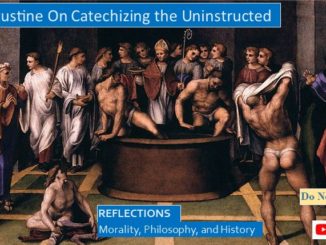
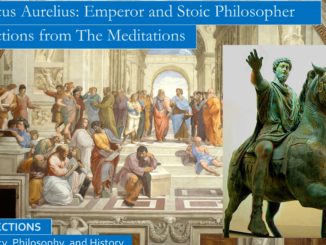
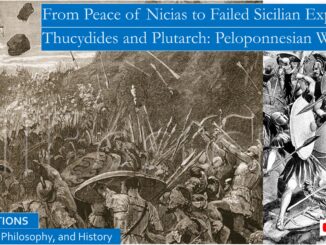
6 Trackbacks / Pingbacks